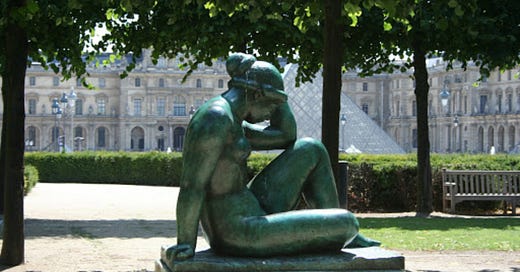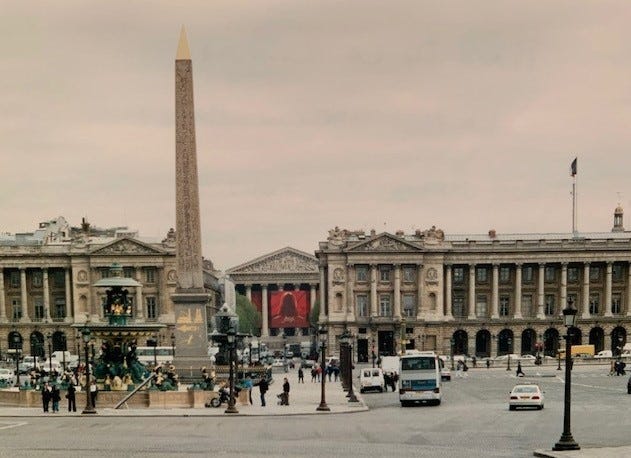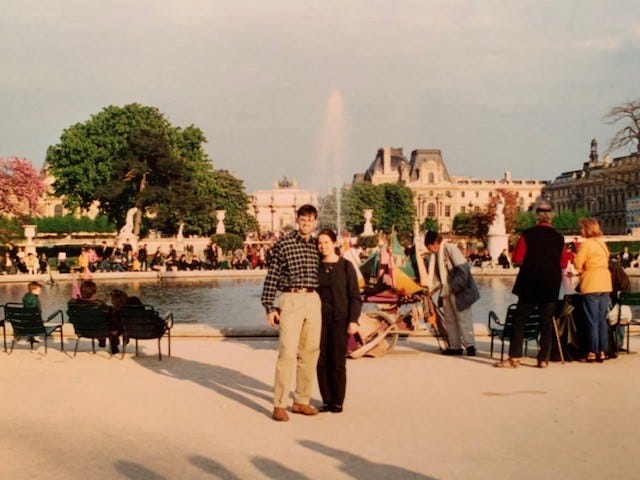Paris, France
April 25, 2000
Virgil traced Athenian etymology to a contest between Athēnâ and Poseidon. The one who bestowed the greatest gift would become patron of the polis. The sea god provided a horse. The goddess of wisdom offered the olive. Cecrops, and history, accepted the bitter fruit of feminine favor.
Dante’s poet also assures us his imperial capital was founded by Aeneas, thru a couple kids nursed by a wolf. One of them left his name on the Eternal City.
Rome, according to romantic accounts and Philippe Auguste, was not the only city derived from Trojan lineage or Olympian immortals. According to that king’s chroniclers, after capturing Helen and having her launch a thousand ships, the son of Priam fathered the Franks, and a city on the Seine.
Who knows? Before the Age of Discovery brought Iberian ships to American shores, great cities usually emerged from the mists. The grander the site, the thicker the fog.
There are, as always, exceptions that prove the rule. Some European cities had definable starts. St. Petersburg on the Neva, Dublin on the Liffey, London on the Thames, Vienna on the Danube, Madrid on the Manzanares, and Cairo on the Nile all have historic origins, and definitive dates.
OK…so maybe the exceptions are the rule. But Paris is apparently so exceptional that it is an exception to the exceptions. We don’t quite know where it came from, but we know where it started.
The Romans likely planted the first settlement on a small island in the Seine. A few hundred years later, the Emperor Julian thought the village of Lutetia…with its fine vines, sweet figs, and gentle climate on the Île de la Cité…so appealing that he refused to leave it to lead legions to the Middle East.
He was not the last to be captivated by the city’s charm, power, women, and wealth. Over the centuries and from around the world, kings, emperors, courtesans, nobles, philosophers, lovers, tourists, scholars, artists, writers, rouges, religious, ruffians, and revolutionaries have descended on Paris. Many have come to claim the city, only to be captured by what they’ve conquered.
We arrived yesterday from Chartres. After an hour on L’Aquitaine autoroute, we penetrated Le Périphérique, crossed the Seine, and followed it to a garage near the Place de la Concorde. There, we bid adieu to our trusty Renault. From it, we pulled our luggage, and dragged it a mile or so to the Hôtel de l’Elysée.
Unlike Château de Tertres, our new B&B offers urbane confinement with its urban convenience. The room is small, tho’ not uncomfortable, and the bathroom implants an newfound appreciation for American plumbing.
The cozy café is airy and pleasant, and offers a nice breakfast with the reasonably priced room. This morning, over coffee and eggs, we learned that we are not the only Americans in our hotel.
While we’ve been in this country, we’ve tried to at least begin conversations in French, even if only to ask whether the poor person bearing the brunt of his butchered language is able to speak ours. In the countryside, the recipients often could not. In the cities, many can, and will usually break quickly into English before we do too much damage to their beautiful native tongue.
Rita retains some of the French she studied in college. My knowledge comes from “Living Language” cassettes that have filled my commute the last couple months, and from sayings, signs, and menus I’ve observed the last several days.
But no matter. We are guests in this country, and should respect the language and customs of our hosts, and not expect them to adopt ours.
Apparently, not everyone agrees.
As we finished our breakfast, the American couple at the next table was starting theirs. They placed their order, which the waitress seemed not to understand. So the man translated into French…by amping up the volume and the condescension of his English.
“O…R…A…N…G…E…“
[pauses to re-load]
“J…U…I…C…E !!!“
We were mortified. I winced, and lowered my furrowed brow into my sweaty palm, hoping by hiding that the waitress would not associate us with our abrasive compatriots. Rita suggested we compensate for our countrymen by leaving a larger tip. I readily agreed, after which we left a café that had suddenly become a bit too cozy.
But for the most part, our new place is perfect. We are in the 8th Arrondissement, a few blocks from L’Elysée Palace. The posh Rue Saint-Honoré guides us east to the Rue Royale, where we can set our bearings between the Church of the Madeleine and Le Place de la Concorde.
This morning, after breakfast, that was our first stop. From there, we made our way to a delightful family reunion. We crossed the Pont de la Concorde, onto the Left Bank, and into the 6th Arrondissement.
There, on the Rue de Grenelle, stands the majestic Musée Maillol, named for Aristide Maillol, and featuring his permanent collection. Its founder and director, the artist’s model and posthumous caretaker, is my wife’s great aunt, Dina Vierny.
Madame Vierny came to France as a child, in the wake of the Russian Revolution, at the onset of Stalin’s reign. Before going to the museum, we met her for lunch.
She spoke to Rita in Russian. My wife translated periodically. I nodded and smiled a lot. But I didn’t want to interrupt the flow of their discussion. Rita sees me often. She seldom sees her aunt, who is an amazing woman.
Despite not understanding the words, I was captivated by the conversation. Dina is a presence, and commands attention. At one point she asked Rita if I spoke Russian, and was not surprised by the answer. When she learned I spoke no French, she was appalled. She turned immediately toward me, eyes wide.
“You must LEARN!”, she proclaimed, hoisting her right index finger for emphasis.
I sat straight up, and quickly back. I then re-folded my napkin, and made sure every utensil, glass, and bread plate was in its proper place.
So that’s that. When I get home, the cassettes continue. I must LEARN! I have my orders, and I dare not defy them.
But I can see why she gave them. Wherever Dina has lived, French has been the language of culture, of class, of civilization. She no doubt thinks me barbaric for being unable to speak it. But after she gently upbraided me, she genuinely smiled, implicitly forgiving my sin for the sake of my wife, who had previously relayed to me her aunt’s story.
When Dina was a young girl, her family fled the Soviet Union. She settled in France, where she became part of the interwar world of surrealist art. She posed for Maillol, thru whom she met, modeled, and worked with Dufy, Bonnard, and Matisse.
During the Occupation, she joined the Réseau de la Resistance, and actively smuggled Jews to safety in Spain, risking her life to spare theirs. She was once arrested in Paris by the Gestapo, spent six months in jail, and was released on an appeal from Maillol to one of Hitler’s favorite sculptors.
After lunch, Dina took us to her museum, and her home. We were given a tour, which featured not only the work of Maillol and Matisse, but also of Kandinsky and Poliakoff, each of whom followed her path from Russia to the Third Republic.
After the tour, we adjourned to Dina’s adjacent apartment, where we saw her son, Olivier, and his two boys. Rita had not seen Dina nor Olivia in almost a decade. Olivier speaks English, which helped Rita facilitate my engagement with her extended family. She shouldn’t have worried. Sometimes, you need not understand the words to comprehend their meaning.
After a short visit, we prepared to go. We said our mercis and au revoirs, and made our way back thru St Germain des Pres toward the Seine. We crossed the Pont Royal, to the Place du Carrousel.
There, between the Tuileries and the Louvre, a series of twenty nude statues adorns the gardens. Rita asked if I recognized them. Somewhat taken aback, I assured her I didn’t. She asked me to look again, and to recall where we’d just been.
I looked another time, and than back at Rita, who smiled. Then it hit me. Aristide Maillol crafted the sculptures, and Dina Vierny donated them. And the donor was the model.
Behind the sculptures was the Louvre, which we plan to visit later this week. My understanding is we could spend our entire visit there, and not exhaust its abundance. But I can’t imagine it being more fulfilling than this single afternoon at a museum on the Left Bank, in the company of its founder, and in awareness of her story.
And I’m not the only one who is impressed. In 1961, Charles de Gaulle awarded Dina the Legion d’Honneur. Today, the honor was all ours.
JD






